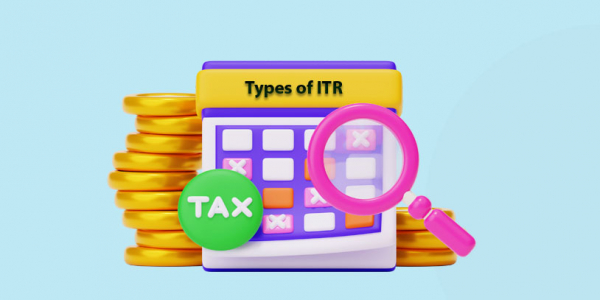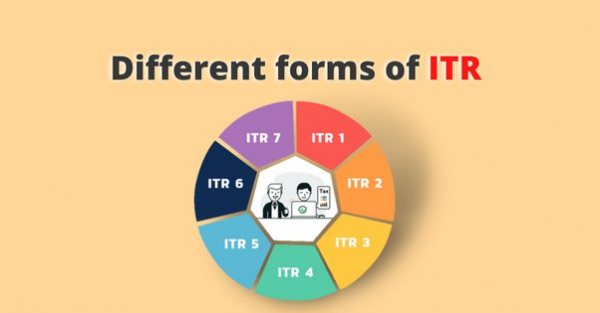Types of ITR: Finding the Right Fit for Your Income
- by B2B Desk 2024-07-17 10:15:56
What is ITR?
An Income Tax Return (ITR) is a crucial document that taxpayers submit to the income tax department, detailing their earnings and the applicable taxes. It’s an essential part of the tax filing process and ensures transparency in income reporting.
Currently, the tax department has introduced seven ITR forms: ITR-1, ITR-2, ITR-3, ITR-4, ITR-5, ITR-6, and ITR-7. Each taxpayer must file their ITR by the specified deadline to remain compliant with tax regulations. The choice of ITR form depends on various factors, including the sources of income, the total income earned, and the taxpayer's category, such as individuals, Hindu Undivided Families (HUFs), or companies. Understanding which form applies to your situation is vital for accurate tax filing and to avoid potential penalties.
Why You Should File Your Income Tax Return
Legal Obligation: Filing your ITR is mandatory for many individuals and businesses. Not doing so can result in hefty fines and penalties.
Easier Loan Approval: Your ITR serves as proof of income, making it easier to secure loans and favorable terms from financial institutions.
Tax Refunds: Filing your ITR is essential to claim any tax refunds you may be owed, especially if you've overpaid through TDS or advance tax.
Carry Forward Losses: Reporting losses in your ITR allows you to offset them against future income, leading to potential tax savings in subsequent years.
Visa Applications: Many countries require tax returns when applying for a visa, so having your ITR ready can simplify the application process and improve your chances of approval.
Types of ITR
Taxpayers need to fill out different Income Tax Return (ITR) forms based on their income level, sources of income, and the nature of their profession. Understanding which form to use is crucial to ensure compliance with tax regulations and avoid potential penalties.
ITR 1
ITR 1 is designed for resident individuals earning income from salary or pension, owning one house property, and having income from other sources, excluding lottery and racehorse winnings. Additionally, agricultural income up to Rs 5,000 is allowed. However, this form cannot be used if your total income exceeds Rs 50 lakh or if you have other specified income sources. It's important to review the eligibility criteria for each form carefully to avoid mistakes.
ITR 2
ITR 2 is meant for individuals who are directors in a company, own unlisted equity shares, or have income from capital gains. It also applies to those with foreign income, agricultural income exceeding Rs 5,000, or assets located outside India. This form is essential for taxpayers who receive benefits from Employee Stock Option Plans (ESOPs) or have carried forward losses from previous years.
ITR 3
ITR 3 is applicable to individuals and Hindu Undivided Families (HUFs) who earn income from a business or profession. This form is necessary for directors of companies or those holding equity in unlisted firms. Filling out ITR 3 accurately is vital for reflecting your business income and fulfilling tax obligations.
ITR 4
ITR 4 is designed for individuals or Hindu Undivided Families (HUFs) who earn income from business or professional activities under the presumptive income scheme. This form is applicable if your total income is below Rs 50 lakh or if you have income from multiple house properties. Utilizing ITR 4 can streamline the filing process while ensuring adherence to tax regulations.
ITR 5
ITR 5 is used by limited liability partnerships (LLPs), bodies of individuals, associations of persons, and business trusts. This form is essential for entities that need to report their income accurately and meet tax obligations as per the Income Tax Act.
ITR 6
ITR 6 is meant for companies that do not claim exemptions under Section 11 of the Income Tax Act. This section pertains to income earned from properties held for charitable or religious purposes. Companies must ensure they fill out this form correctly to comply with tax laws.
ITR 7
ITR 7 is relevant for individuals or entities earning income from charitable or religious trusts, political parties, and educational or medical institutions. This form is essential for ensuring transparency and accountability in the financial reporting of these organizations.
Understanding which ITR form applies to your situation is essential for accurate tax filing and compliance. Always review the specific criteria for each form to ensure you're using the correct one.
Types of ITR Forms to File
Form 16
Form 16 is a TDS certificate issued by an employer to their employees. This form provides a comprehensive overview of the employee's gross pay, including exemptions such as House Rent Allowance (HRA) and Leave Travel Allowance (LTA). Additionally, Form 16 details the employee's net taxable income, any reported losses, and tax-saving deductions. It also outlines the amount of TDS deducted from the employee's salary, making it an essential document for filing income tax returns.
Form 26AS
Form 26AS contains crucial information about the tax deducted at source (TDS) on various types of income, including salary, interest, and capital gains from the sale of property. This form not only provides details about TDS but also includes information on self-assessment tax and advance tax payments made by the individual. Additionally, it lists high-value financial transactions, making it an important tool for taxpayers to keep track of their tax credits and liabilities.
Form 15G and Form 15H
Forms 15G and 15H are used to earn income without TDS deductions. Form 15G can be submitted if you are under 60 years old and your total taxable income is below the basic exemption limit. This form helps individuals ensure that TDS is not deducted on their income unnecessarily. On the other hand, Form 15H is for senior citizens whose tax liability on their net income is zero. Both forms must be submitted to the payer to avoid TDS deductions. Using these forms can help taxpayers manage their finances more effectively and maximize their income.
Who are Exempted from Filing Income Tax Returns?
The central government has the authority to exempt specific individuals or classes from filing income tax returns. This is in addition to existing exemptions, which include individuals whose total income is below the basic tax threshold and non-residents who do not have income sourced from India.
However, as of now, the government has not implemented any new exemptions in this context. It’s important for taxpayers to stay informed about any updates or changes in regulations that may affect their filing obligations in the future. Understanding these rules can help individuals make better financial decisions and ensure compliance with tax laws.
FAQs
Q. What are the different types of ITR forms available?
A. There are seven types of ITR forms: ITR-1, ITR-2, ITR-3, ITR-4, ITR-5, ITR-6, and ITR-7.
Q. How do I determine which types of ITR to file?
A. The types of ITR you should file depend on your income sources, total income, and taxpayer category.
Q. What types of ITR forms are suitable for salaried individuals?
A. Salaried individuals typically use types of ITR such as ITR-1 or ITR-2, depending on their total income and exemptions.
Q. Which types of ITR forms are for businesses or professionals?
A. Types of ITR forms like ITR-3 and ITR-4 are designed for individuals and HUFs with business income or professional earnings.
Q. Are there specific types of ITR forms for senior citizens?
A. Yes, senior citizens can file types of ITR forms like ITR-1 or ITR-2, considering their income limits.
Q. Can I use the same types of ITR form for different assessment years?
A. No, the types of ITR forms can change based on your income and circumstances from year to year, so you should check each time.
Q. What types of ITR should non-residents file?
A. Non-residents generally need to file types of ITR forms like ITR-2 or ITR-3, depending on their income in India.
Q. Which types of ITR are applicable for individuals with capital gains?
A. If you have capital gains, consider types of ITR such as ITR-2 or ITR-3 to report this income accurately.
Q. What types of ITR are required for filing income from trusts?
A. For income from trusts, the appropriate types of ITR would be ITR-5 or ITR-7, depending on the trust’s nature.
Q. Do types of ITR forms change every financial year?
A. Yes, types of ITR forms may be updated or revised each financial year, so it’s essential to check for the latest forms before filing.
Also Read: ITR Filing 2023-24: The Importance of Submitting Form 10-IA for Disability Deductions
POPULAR POSTS
Loan EMIs to Drop as RBI Slashes Repo Rate - Full MPC December 2025 Highlights
by Shan, 2025-12-05 11:49:44
Zoho Mail vs Gmail (2025): Which Email Platform Is Best for Businesses, Startups, and Students?
by Shan, 2025-10-09 12:17:26
PM Modi Launches GST Bachat Utsav: Lower Taxes, More Savings for Every Indian Household
by Shan, 2025-09-24 12:20:59
$100K H-1B Visa Fee Explained: Trump’s New Rule, Clarifications & Impact on Indian Tech Workers
by Shan, 2025-09-22 10:11:03
India-US Trade Deal Soon? Chief US Negotiator Arrives in Delhi as Talks Set to Begin Tomorrow
by Shan, 2025-09-15 11:54:28
Modi Meets Xi: Trump’s Tariffs, Strategic Autonomy, and the Future of Asia’s Power Balance
by Shan, 2025-09-03 06:40:06
Google Claims Gemini AI Uses Just ‘Five Drops of Water’ Per Prompt, Sparks Debate
by Shan, 2025-08-22 12:34:27
RECENTLY PUBLISHED

Pine Labs IPO 2025: Listing Date, Grey Market Premium, and Expert Outlook
- by Shan, 2025-11-05 09:57:07

The Agentic Revolution: Why Salesforce Is Betting Its Future on AI Agents
- by Shan, 2025-11-05 10:29:23

Top 10 Insurance Companies in India 2026: Life, Health, and General Insurance Leaders Explained
- by Shan, 2025-10-30 10:06:42

OpenAI Offers ChatGPT Go Free in India: What’s Behind This Big AI Giveaway?
- by Shan, 2025-10-28 12:19:11

Best Silver Investment Platforms for 2025: From CFDs to Digital Vaults Explained
- by Shan, 2025-10-23 12:22:46





 Subscribe now
Subscribe now 